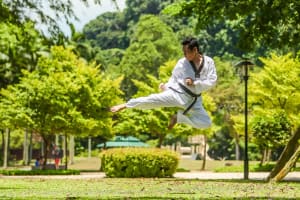
I have been an avid participant in martial arts since I was a child. Over the years, I have seen it evolve, devolve, and sometimes warp into an amazing amalgamation of beautiful pageantry and mutual violence. There was always something very real about standing toe to toe with someone, agreeing to try and hurt each other, and then sharing a shake and a hug, or a fist bump. But as the arts have grown, so have its many faces. The future of what martial arts will look like, along with its close relative in combat sports, is uncertain. As we look at the current trends, can we predict what comes next? Can we lay out a plan for the future? Can we train in such a fashion to anticipate and adapt to drastic changes? At the core of martial arts is an underlying purpose, to be prepared for anything. So, let us take a look and ask the hard questions.
First off, like many things in the future, we must visit the past. Not too long ago we were all ordered to stay inside, cut off from the world. This of course brought many challenges as businesses and schools shuttered their doors and income came to a halt. But it wasn't just martial arts schools; it was fight promotions as well. Big fight promotions were just waiting to see which state opened up first to find a venue. They tried fights with no crowds, no cheering, no applause. You could feel the emptiness. Martial arts schools around the world were panicking to find alternatives to in-person training. They immediately made the rough transition to video lessons. Now, some schools were more prepared than others, but it was almost always a hybrid/supplemental scenario. The video lessons are a great alternative when adaptation is required in a pinch. The problem though, just like anything that needs discipline and focus, it's difficult to do in a setting that also includes a couch and a television... and possibly ice cream. So, how do we merge the two? Ever since our isolation, there has been a huge social disconnect from teacher to student, from trainers to clients, and from instructors to class. Enter virtual reality? Sure, it's another screen, but what if the screen is attached to your face? When you looked around you were in the gym, or dojo, and possibly even with your teammates'/classmates' chosen avatars? Your instructor is in front of you, ready to engage, or answer questions, correct technique even? It seems as more and more fields of business embrace our advancements in technology, I don't see it as an impossibility to have a hive of martial arts data and an advanced AI teaching group classes at your local gym. The hard questions will be, will this increase or decrease the disconnect between us? Will it replace us as coaches? Will we see students at competitions with AI logos on the sleeve? Or will it just be an option for the introverted hobbyist who prefers the comfort of their apartments?
Now, we may have gone too far forward on that last one, so let us bring it back down to the core. The biggest question that remains to be answered fully, has always been what style is most effective? Even with all the fights, all the data, it's impossible to answer definitively. World champions in the biggest and most well-known promotions may tout Jiu-Jitsu, or Wrestling, and get dethroned by a kickboxer the very next event. These exact events gave birth to the ultimate new style... MMA. Mixed styles aren't new, nor is cross-training. This is different, the jack of all trades approach to martial arts without any sort of specialization. Is this just a constant battle of trying to plug the holes in your fighting game? Will it lead to a constant imbalance? Will it ultimately lead to a mess of techniques where one is neither good nor bad at any given style, just a constant switch being left in between on and off? Ultimately, grappling's introduction into the mainstream and somewhat narrow field of stand-up martial arts was a heavy blow to many styles. It almost immediately forced an entire population to up its game and evolve. But with that evolution, there has been a straying from the path. The formal aspects of some martial arts were beneficial to teaching respect and discipline along with the very real connection between mind and body. I predict a scenario for this question, a "what if," as it were. I predict that we will eventually circle back around and on a long enough timeline, we will see a cycle in the state of combat and martial arts. Mixed martial arts will dominate the mainstream, there won't be a single fighter with a specialization, something that they have mastered. All the fight promotions are the same old fight, identical to the one before. In an effort to find something new, they scour the internet and review hours and hours of video until... In a cage match at a small local promotion, a young fighter walks in... in what appears to be pajamas with a belt tied around their waist. Dynamic in their movement, not one shot, not one takedown, wins in glorious fashion with dynamic movement and timing along with well-placed kicks and punches. It's discovered again, anew.
In reflection, another trend reshaping the landscape is Martial Arts Fitness Trends. The integration of fitness technology into martial arts training is set to change how practitioners engage with the art. Wearable fitness trackers, mobile apps, and personalized online training schedules are making martial arts more accessible to the general public and not just traditional practitioners. This technology allows for a more data-driven approach to training, providing feedback on performance, heart rate, calorie burn, and more, thereby enhancing the training experience and outcomes. These trends are making martial arts not only a form of self-defense but also a comprehensive fitness regime that appeals to health-conscious individuals. The future may see martial arts becoming as commonplace in general fitness routines as yoga or pilates, which would dramatically increase its global reach and influence.
As we stand on the cusp of these significant changes, the world of martial arts is undeniably moving towards a more integrated, technologically enhanced future. While we embrace these advancements, it's crucial to preserve the essence of martial arts, which teaches discipline, respect, and the art of self-defense. By adapting thoughtfully to these trends, we ensure that martial arts continue to enrich lives, not just through physical training but as a holistic discipline that nurtures the mind, body, and spirit. Let's move forward with an open mind and a strong stance, ready to welcome the new era of martial arts.


